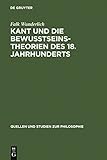Kant und die Bewußtseinstheorien des 18. Jahrhunderts / Falk Wunderlich.
Material type: TextSeries: Quellen und Studien zur Philosophie ; 64Publisher: Berlin ; Boston : De Gruyter, [2011]Copyright date: ©2005Description: 1 online resource (274 p.)Content type:
TextSeries: Quellen und Studien zur Philosophie ; 64Publisher: Berlin ; Boston : De Gruyter, [2011]Copyright date: ©2005Description: 1 online resource (274 p.)Content type: - 9783110179774
- 9783110902426
- 126 22
- B2798 .W86 2005eb
- online - DeGruyter
- Issued also in print.
| Item type | Current library | Call number | URL | Status | Notes | Barcode | |
|---|---|---|---|---|---|---|---|
 eBook
eBook
|
Biblioteca "Angelicum" Pont. Univ. S.Tommaso d'Aquino Nuvola online | online - DeGruyter (Browse shelf(Opens below)) | Online access | Not for loan (Accesso limitato) | Accesso per gli utenti autorizzati / Access for authorized users | (dgr)9783110902426 |
Browsing Biblioteca "Angelicum" Pont. Univ. S.Tommaso d'Aquino shelves, Shelving location: Nuvola online Close shelf browser (Hides shelf browser)

|

|

|

|

|

|

|
||
| online - DeGruyter Der Kommentar des Iohannes de Segarellis zu Senecas 'Hercules furens' : Erstedition und Analyse / | online - DeGruyter Verb-Particle Explorations / | online - DeGruyter Perfect Explorations / | online - DeGruyter Kant und die Bewußtseinstheorien des 18. Jahrhunderts / | online - DeGruyter Identity and Marginality among New Australians : Religion and Ethnicity in Victoria's Slavic Baptist Community / | online - DeGruyter The Generative Enterprise Revisited : Discussions with Riny Huybregts, Henk van Riemsdijk, Naoki Fukui and Mihoko Zushi / | online - DeGruyter Kafka und Prag : Colloquium im Goethe-Institut Prag 24.–27. November 1992 / |
Dissertation FU Berlin 2003.
I-X -- Einleitung -- I Bewußtsein und Selbstbewußtsein im 18. Jahrhundert -- 1 Voraussetzungen -- 2 Die wolffianische Schulphilosophie -- 3 Selbständigere rationalistische Theorien -- 4 Empiristische Theorien -- 5 Étienne Bonnot de Condillac und Charles Bonnet -- 6 Zusammenfassung: Bewußtseinstheorie im 18. Jahrhundert -- II Kant über Bewußtsein, Apperzeption und Selbstbewußtsein -- 1 Kants Begriffserklärungen -- 2 Spontaneität der Apperzeption -- 3 Reinheit und Ursprünglichkeit der Apperzeption -- 4 Bewußtsein und Urteil -- 5 Zusammenfassung: Kant und die Tradition -- III Die Apperzeptionstheorie in der transzendentalen Deduktion Β -- 1 Identität und Einheit der Apperzeption -- 2 Warum ist analytische Einheit der Apperzeption nur unter Voraussetzung einer synthetischen möglich? -- 3 Erklärungen aus der Literatur -- 4 Ein alternativer Erklärungsansatz -- Schluß -- Bibliographie -- Personenregister
restricted access online access with authorization star
http://purl.org/coar/access_right/c_16ec
Der Autor präsentiert einen grundlegend neuen Ansatz zum Verständnis der Kant'schen Bewusstseinstheorie. Er vertritt die These, dass Kant die Standard-Ansichten über Bewusstsein, Apperzeption und Selbstbewusstsein aus den Diskussionen des 18. Jahrhunderts nur eingeschränkt modifiziert und ihre begrifflichen Grundlagen beibehält.
Falk Wunderlich advances a fundamentally new approach to an understanding of Kant's theory of consciousness. In the first part of his study, he presents a detailed reconstruction of 18th century discussions on the theory of consciousness, focusing on those discussions in the context of which Kant's deliberations took place. In the second part, Kant's approaches to a theory of consciousness are related to these contemporary debates. The author takes the view that, contrary to appearances, Kant only modifies the standard contemporarary views on consciousness, apperception and consciousness of self to a limited degree and retains their terminological bases. Finally, an alternative interpretation of transcendental discussion is offered against the background of this contextualisation.
Issued also in print.
Mode of access: Internet via World Wide Web.
In German.
Description based on online resource; title from PDF title page (publisher's Web site, viewed 28. Feb 2023)


